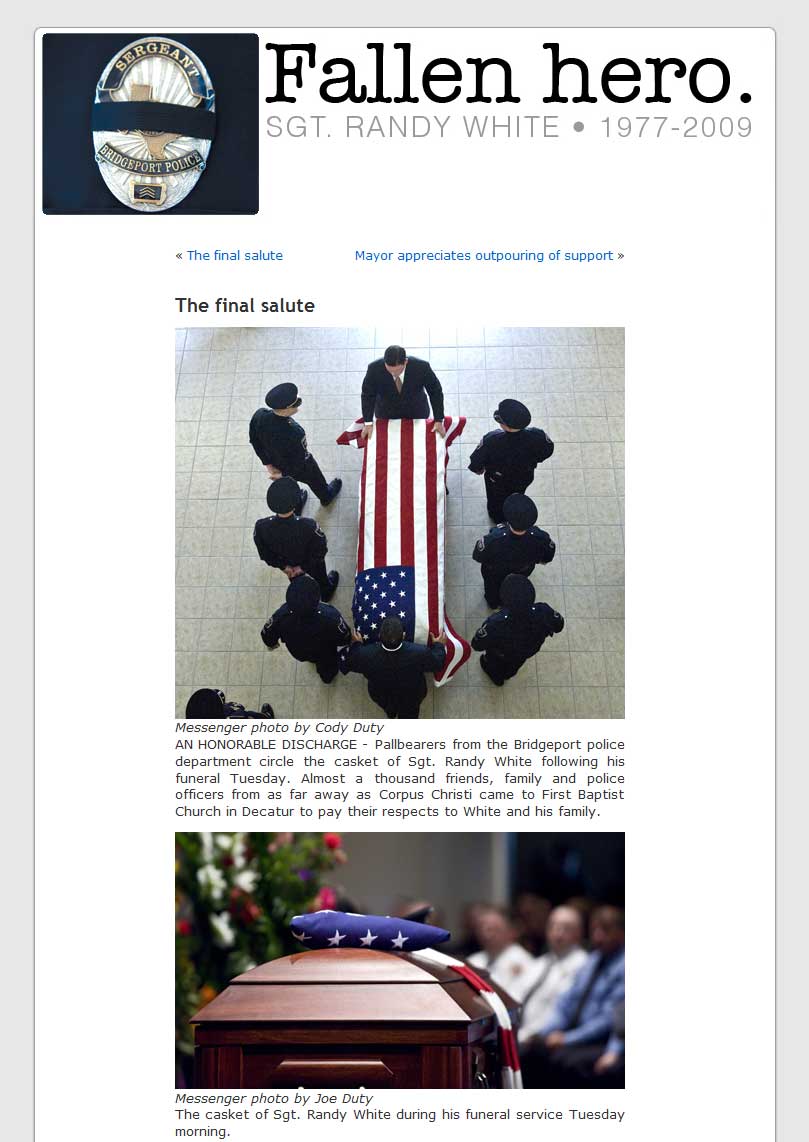What happens when a major news story breaks in your hometown? Do you surrender the coverage to the near-by major market daily and television stations or do you “lead the coverage” through your web site, even though the story broke the day after you went to press.
The importance of developing a culture of covering “breaking news” on your web site was never more evident in early April when violent criminal activity broke in Wise County — a county of 60,000 persons a half-hour northwest of Fort Worth.
There had been an almost hour-long police chase of a man suspected of hit-and-run driving and car theft when the man, driving a stolen GMC Yukon, slammed into the back of a Bridgeport police car, ramming the car into a trailer and instantly killing Police Sgt. Randy White.
Reporters in the Wise County Messenger newsroom had been following the chase on police scanners when it came to a crashing halt in Bridgeport. Photographer Joe Duty, busy shooting a track meet, was alerted. General Manager Mark Jordan grabbed graphic artist Andrew May who also handles video for the paper and off they rushed to the accident site about 10 miles away from the newspaper office in Decatur.
That proximity gave them a good half-hour to hour jump on the big city newspapers and television stations. Working quickly, reporters Robert Morgan, Travis Measley, Denny Deady and Kristin Tribe got the story up on the newspapers “breaking news” page. Production Manager Todd Griffith kept updating the story with Duty’s photos from the scene. Video with the Department of Public Safety spokesman was on the web site before the metro television stations’ 5 p.m. newscasts.
Throughout the night and the next day the Messenger kept updating the story with more details and photographs. Wise County Sheriff David Walker, who had a helicopter at the scene, asked Duty to shoot crime scene photos — giving the newspaper the aerial coverage that could have been a television exclusive.
Later, Bridgeport police asked Duty to accompany them to DFW Airport to pick up the “honor flag” that is flown when a police officer or firefighter dies in the line of duty.
A dramatic cover in the Messenger’s Sunday April 5 edition of the police officers’ badge draped with black tape capped the newspapers coverage. The story began on page two with photos from the scene.
The culture of “breaking news” was also a headline-grabbing experience for Randy Mankin of the Eldorado Success in 2007 with the raids on the compound of alleged child abusers in Schleicher County.
In Randy’s case, newspapers and television stations from throughout the nation used his stories and some even “moved in” to the newspaper’s office during the siege.
What both these stories emphasize is the importance of building relationships with the law enforcement community. They learn to trust the local paper and when major stories hit, most policemen and firefighters will not forget those relationships.
I recently read a quote in theTCU Magazine from the great Sports Illustrated writer and author Dan Jenkins, who was asked to compare current TCU coach Gary Patterson with a couple of his great predecessors, Abe Martin and Dutch Meyer.
Jenkins said that times were different today and Patterson had to be more cautious with the media — but that wasn’t the case with Martin and Meyer. Of the reporters covering Meyer and Martin, Jenkins said “it was easier for them to make friends with the press and trust them. I was part of that. We weren’t scandal mongers and we knew what to write and they appreciated that. We earned their trust and therefore we came up with a lot of good information that we could eventually use when the time and atmosphere was right.”
To me, that is what community newspaper publishers editors, photographers and reporters do every day.
And when breaking news happens — and your newspaper is ready — it will pay off big time as we fulfill our responsibility to be the dominant source of information for the community.
See all of the Messenger‘s coverage about the death of Sgt. Randy White



